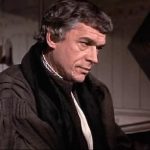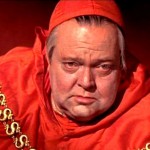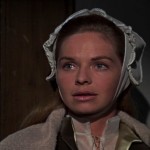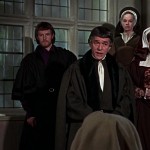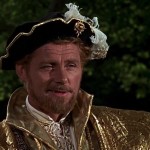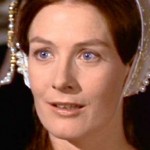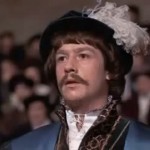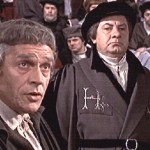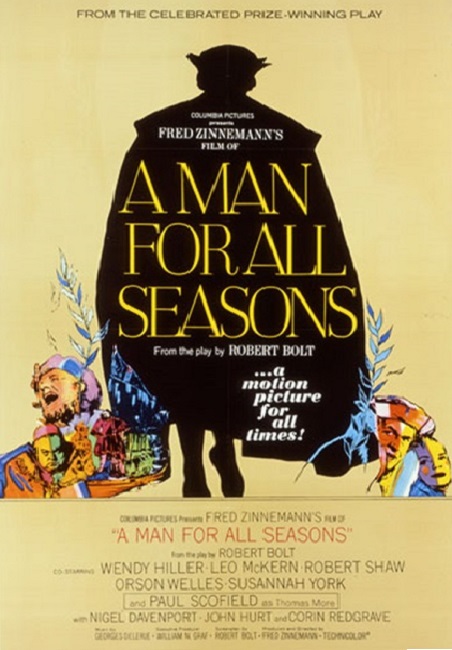
A Man For All Seasons – 1966
I liked this movie. It was a period piece done right. The plot is centered around Sir Thomas More and his opposition to King Henry VIII and his divorce from his first wife, Catherine of Aragon. Paul Scofield played the lead role of Thomas More, though he had not been the first choice to do so. The part had originally been offered to two other notable actors, Richard Burton and Lawrence Olivier. However, since Scofield had done it on Broadway, director, Fred Zinnemann demanded that he also do the movie. It was a good thing he got his way, as Scofield won the Academy Award for Best Actor. And he truly did a fantastic job.
So, here is the brief history lesson, as told by the original play’s author, Robert Bolt, to set up the plot. King Henry VIII needed a legitimate heir to the throne of England. Unfortunately, his wife, Catherine of Aragon, was barren, and Henry’s attentions turned to one of her handmaids, Anne Boelyn. In order to marry Anne, he needed a divorce from Catherine. However, his divorce was not exactly legal. He needed to Pope’s permission to have it done. Sir Thomas More was, at the time, a member of the Privy Council, and the only member to oppose the divorce. You see, More was a very religious man who was of the opinion that since God had joined them in marriage, it was not man’s place to pull them apart. Marriage was forever, like it or not.
More was a man of unbreakable character and principles. He remained true to the convictions of his heart, even unto the chopping block where he was beheaded. He was able to go that distance because he believed with all his heart that he was right, and that God would judge the rightness of his actions in the end. And when his opposition to the King got him in trouble, he believed that his silence on the subject would protect him.
So, he kept his silence though the whole world tried to persuade him to just conform, to go along with the King’s divorce, to betray his own principles just once. But it was a door he refused to open. He had the letter of the law on his side that said that the king could not legally harm him, physically, as long as he would say nothing against the divorce. So he used his words cleverly, never once slipping, never incriminating himself, never giving the King and his lawyers the legal recourse to put him to death. They put him in prison, deprived him of everything he had ever known or loved, including the comfort of his family. That is, until they allowed him to see his wife, daughter, and son-in-law. But even then, the brief visit was for the sole purpose of persuading him to give up his fight.
But still, he refused.
Scofield really turned in a powerful performance. The quiet despair and dignity with which he endured his personal tragedy, his march into martyrdom, was truly inspired. The heart wrenching scene where his family is sent to him was particularly well done. Scofield’s performance was honest and believable, demanding respect and attention from the audience.
And Scofiled was not the only outstanding member of the cast. Wendy Hiller played More’s wife, Alice, who could see her husband’s descent to his doom, but who could do nothing to stop it. And yet it was that very quality which led him to his death that made her love him all the more. Susannah York, played his daughter Margaret. You may remember her from her role in the campy farce Tom Jones, but here she really got to shine in a serious and powerful dramatic role. She was gorgeous and her character really showed some emotional depth.
But of all the rest of the cast, the one who really caught my attention was Robert Shaw as King Henry VIII. He was incredibly fascinating to watch, and though he did not win, he was nominated for Best Supporting Actor. His portrayal of the spoiled and, yes, even childish monarch was captivating. He seemed to draw my attention, making me focus on him. He threw terrific and believable tantrums when he was angry or when he thought they would get him what he wanted, and was able to turn them off like a light for dramatic effect.
Another member of the cast who I have to mention was John Hurt. He played the part of Richard Rich, and it was his first major role. He did a great job, even though he played a despicable character. He was the one who really betrayed More in the end. Not knowing the story or the actual historical events, I didn’t see it coming. I didn’t realize how low he would sink, though it was completely true to the character.
But it was Leo McKern, playing the part of Thomas Cromwell, a member of Henry’s court and More’s primary prosecutor that was really the bad guy. From the very beginning he was made out to be ambitious and conniving. He is clearly jealous of More’s friendship with the King, his popularity with the people, his status and position, and I think even his pious nature. Since he clearly had none of these qualities, he went out of his way to destroy More. McKern made it easy to despise the character.
Interesting note: Speaking of cast members, Vanessa Redgrave was originally offered the role of Margaret, though she had to turn it down due to other commitments. However, she did end up playing the cameo role of Anne Boelyn on the condition that she not be billed in the part nor mentioned in the previews. She did this purely for the fun of it and refused to accept any money for her performance.
Aside from a few minor changes that one might expect from a play that is adapted into a film, the movie remained true to Robert Bolt’s original script. One of the changes is in regards to the bits of information that were given about the surviving characters. In the film, the following is revealed at the end, via a narrated voice-over: “Thomas More’s head was stuck on Traitor’s Gate for a month. Then his daughter, Margaret, removed it and kept it ‘til her death. Cromwell was beheaded for high treason five years after More. The Archbishop was burned at the stake. The Duke of Norfolk should have been executed for high treason but the King died of syphilis the night before. Richard Rich became Chancellor of England and died in his bed.”
All of which goes to show that the plot was, in this respect, very realistic. Some people are punished for their crimes against their fellow men, while others are not. The film was a wonderful depiction of this simplistic, yet unfortunate idiom.
Interesting note: Bolt borrowed the title from Robert Whittington, a contemporary of More, who wrote in 1520, “More is a man of angel’s wit and singular learning. I know not his fellow. For where is the man of that gentleness lowliness and affability? And, as time requireth, a man of marvelous mirth and pastimes, and sometimes of as sad gravity. A man for all seasons.”
